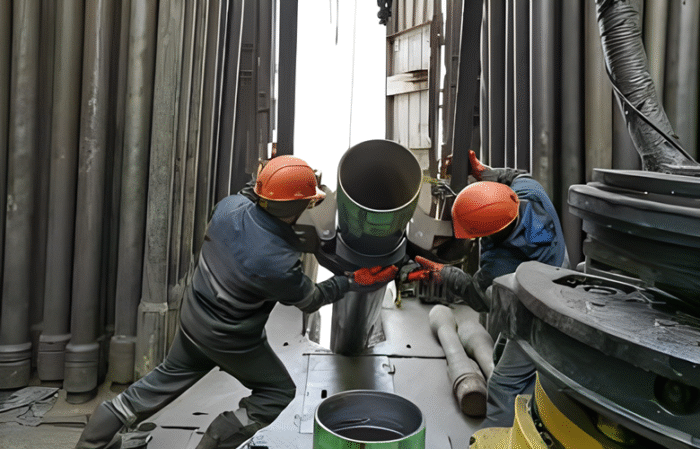What Is Gilsonite and Why Is It Used in Oil and Gas Well Cementing?
Gilsonite, also known as natural bitumen or uintaite, is a naturally occurring, resin-rich hydrocarbon mineral. In oilfield applications, Gilsonite is used as a cement additive in wellbore cementing operations, especially in challenging drilling environments. Gilsonite Oil and Gas Well Cementing is a critical process in the oil and gas industry that involves the placement of cement slurries into the annular space between the wellbore and the casing. The primary objective of well cementing is to ensure well integrity, zonal isolation, and the prevention of fluid migration between different formations.
Its low specific gravity, sealing properties, and thermal stability make it a valuable material for:
-
Reducing slurry density
-
Preventing lost circulation
-
Improving zonal isolation
-
Enhancing bonding between casing and formation
The cement used in Gilsonite Oil and Gas Well Cementing is typically a mixture of cement, water, and additives. The specific formulation of the cement slurry depends on various factors such as well conditions, formation properties, and desired cement properties. The cement slurry is pumped down the casing and circulated up the annulus, displacing drilling fluids and filling the space between the casing and the wellbore.
Key Functions of Gilsonite in Cementing Operations
1. Lightweight Slurry Formulation
Gilsonite has a density of ~1.0–1.1 g/cm³, significantly lower than standard cement. This allows engineers to create lightweight slurries without sacrificing strength—ideal for:
-
Depleted zones
-
Fractured formations
-
Weak or unconsolidated intervals
To optimize the performance of well cementing, various additives are used in the cement slurry. These additives can modify the properties of the cement, such as setting time, viscosity, fluid loss, and strength. Additives like retarders or accelerators help control the setting time of the cement, allowing sufficient time for proper placement and displacement.
Lost Circulation Control
Gilsonite’s resilient particles physically plug fractures and pores in the formation, reducing or eliminating:
-
Cement slurry loss
-
Non-productive time (NPT)
-
Formation damage
Enhanced Zonal Isolation
Gilsonite increases the flexibility and bonding of cement sheaths, leading to:
-
Better sealing around casing
-
Reduced micro-annuli
-
Long-term wellbore integrity
Gilsonite Oil and Gas Well Cementing serves multiple purposes in the oil and gas industry. One of the key objectives is to create zonal isolation, which refers to the isolation of different formations or production zones within the wellbore. Zonal isolation is crucial to prevent the migration of fluids between formations and to ensure that production and injection occur in the desired zones. Proper zonal isolation helps maximize production efficiency and minimize the risk of environmental contamination.
4. Improved Fluid Loss Performance
Gilsonite acts as a physical barrier in the slurry to reduce filtrate invasion, improving:
-
Filter cake quality
-
Formation protection
-
Job reliability
Fluid loss additives help reduce the loss of water from the cement slurry, ensuring better coverage and bond strength. Additionally, strength-enhancing additives can improve the compressive strength and durability of the cured cement.
5. Compatibility with API Cements
It blends well with API Class G or H cements and is compatible with conventional additives like:
-
Retarders
-
Accelerators
-
Dispersants
-
Expanding agents
Another important function of well cementing is to provide mechanical support to the casing and prevent its collapse. The cement forms a strong bond between the casing and the wellbore, providing structural integrity and stability. This helps prevent wellbore instability, casing deformation, and potential leaks or failures.
Gilsonite Oil and Gas Well Cementing also plays a role in preventing fluid migration behind the casing. It seals off the annular space, preventing the movement of fluids from one formation to another. This is particularly important in situations where there are different pressure regimes or the presence of hydrocarbons in one formation that could contaminate another.
Well Cementing is a complex process that requires careful planning, execution, and quality control. It is essential to follow industry best practices, regulations, and standards to ensure successful cementing operations. Monitoring techniques, such as cement bond logs and pressure testing, are often employed to evaluate the quality and effectiveness of the cement job.
Typical Applications of Gilsonite in Oilfield Cementing
| Application | Benefit of Gilsonite |
|---|---|
| Primary cementing | Lightweight, good sealing, thermal stability |
| Remedial cementing | Seals voids, improves bonding |
| Plug and abandonment (P&A) | Long-term isolation, corrosion protection |
| HPHT well cementing | Withstands high temperatures and stress |
| Lost circulation zones | Prevents slurry losses |
📏 Typical Gilsonite Dosage in Cementing
-
3% – 10% BWOC (By Weight of Cement) for lightweight formulations
-
Up to 15% BWOC for severe lost circulation
-
5% – 10% BWOC for enhanced sealing and gas migration prevention
Always lab-test your slurry design for compatibility and performance.
Technical Benefits of Gilsonite in Cement
-
📉 Reduced Slurry Density: Helps manage weak formations
-
🧱 Improved Compressive Strength: Adds structure while keeping weight low
-
🛑 Gas and Fluid Migration Barrier: Reduces sustained casing pressure (SCP)
-
♻️ Environmentally Friendly: 100% natural mineral with low environmental impact
-
🔥 Thermal Stability: Withstands bottomhole temperatures up to 300°F (150°C)
Frequently Asked Questions (FAQs)
What is Natural bitumen used for in cementing?
Natural bitumen is added to reduce slurry weight, prevent lost circulation, and improve cement flexibility and sealing.
Can Gilsonite be used in deep wells?
Yes. It remains stable up to 300°F (150°C), making it suitable for deep and high-temperature wells.
How does Gilsonite help with gas migration?
Natural bitumen improves cement bonding and reduces micro-annuli, which helps prevent gas flow behind the casing.
Is Gilsonite compatible with other cement additives?
Absolutely. It blends well with dispersants, retarders, accelerators, and other common additives.
🧰Pro Tip for Cementing Engineers
Use 200-mesh fine Gilsonite for optimal dispersion and slurry uniformity. Always test with formation-specific fluid loss and strength requirements.
Conclusion: Gilsonite Enhances Cement Integrity and Operational Efficiency
In oil and gas well cementing, Gilsonite serves as a high-performance additive that tackles multiple challenges—lightweighting, sealing, bonding, and durability. Whether you’re cementing in a fractured formation, dealing with high-pressure gas zones, or trying to avoid costly remediation, Gilsonite delivers measurable value.
As the industry pushes into deeper, hotter, and more complex wells, incorporating Natural bitumen in your cement design helps ensure long-term well integrity, safety, and production performance.
In summary, well cementing is a critical process in the oil and gas industry that ensures well integrity, zonal isolation, and the prevention of fluid migration. Proper cementing practices, including the use of additives, help create a strong bond between the casing and the wellbore, providing structural support and sealing off different formations. By employing well-designed cement slurries and adhering to industry standards, operators can achieve reliable and effective well cementing, contributing to the long-term success and productivity of oil and gas wells.
Source Premium Gilsonite from a Trusted Supplier
Looking for high-quality cementing-grade Gilsonite?
At PARS Universal Bitumen LTD, we offer:
-
✅ High-purity Gilsonite (powder and granular)
-
✅ Custom cement additive blends
-
✅ Global shipping and fast delivery
-
✅ Technical consultation for cement jobs
Get in touch today to speak with our experts, request a technical data sheet, or receive a custom quote for Cementing Grade Gilsonite tailored to your drilling project. PUB-Ltd as your Gilsonite oilfield supplier Supplier.
📩 Contact Us Now to learn how our premium-grade Gilsonite can boost the strength, flexibility, and reliability of your oil well cementing operations. For more information or to place an order, please contact PUB-Ltd sales team @ Contact Us.





